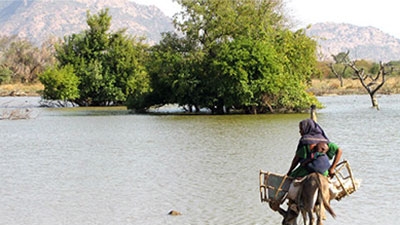Reliable water supply can reduce excessive deaths among girls in infancy and early childhood due to water-borne diseases; and improve rural women’s livelihoods and welfare, as it allows them to spend less time on domestic work and more time on farming and other economic activities.
However, a lot needs to be done to make access to safe water supply a reality for rural people. Improved supplies need to be constructed on a large scale and financing for this construction needs to be mobilized.
“We have seen that it is not enough to construct safe drinking water supplies; they must continue to supply safe water in sufficient amounts, so sustainability is key,” explains Julia Bucknall, sector manager for the World Bank’s central Water Unit.
Partnering to share global knowledge
“All this points to the need to share knowledge about rural water supplies more widely, among Bank staff and with rural water supply experts and practitioners around the world,” says Ato Brown, World Bank sector manager for water in the Middle East and North Africa Region.
The World Bank has decided to assist in building a worldwide community of practice on rural water supply by partnering with RWSN, a global knowledge network for rural water supply technologies and approaches.
The statement of common interest signed April by the World Bank and WSP supports RWSN’s new strategy to provide sustainable rural water services for all and highlights the sustainable development of groundwater for rural drinking water supplies, equity and inclusion in service provision, and appropriate management for sustainable rural water services at scale.
The World Bank and WSP are executive partner organizations of RWSN, along with the African Development Bank, the IRC Water and Sanitation Centre, the Skat Foundation, the Swiss Agency for Development and Cooperation, UNICEF, and WaterAid.
New webinar series
The World Bank and RWSN also launched a new webinar series on aimed at sharing the best global knowledge on rural water supply.
“The series will feature speakers from the 6th International RWSN Forum, which brought together an outstanding group of international experts to share the latest knowledge about providing rural people with safe water on a sustainable basis,” Bucknall said.
Carter will kick off the series with a webinar on Myths of Rural Water Supply, a provocative re-examination of some common premises underlying rural water supply programs. Ato Brown and Samuel Mutono, of WSP-Africa, will be participants.
Upcoming webinars in the series will focus on topics such as rural water supply and sanitation challenges in Latin America, actions to attract investment to African rural water supply, and WASH and equity.
The webinars are open to anyone with Internet access via a computer, smartphone, or tablet. The series will run from April 3 through June 12, every Tuesday from 9:30-11:00 a.m. EDT. Register for more information, or visit the webinar series website.
Contributed by Elizabeth Kleemeier, Senior Water and Sanitation Specialist, and Cathy Russell, Senior Communications Officer, World Bank.


